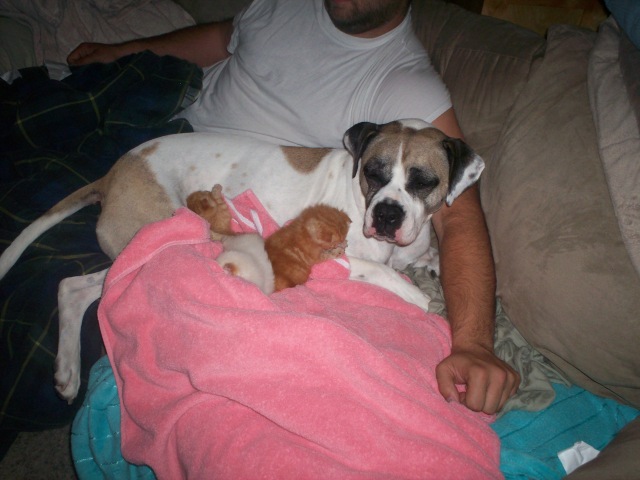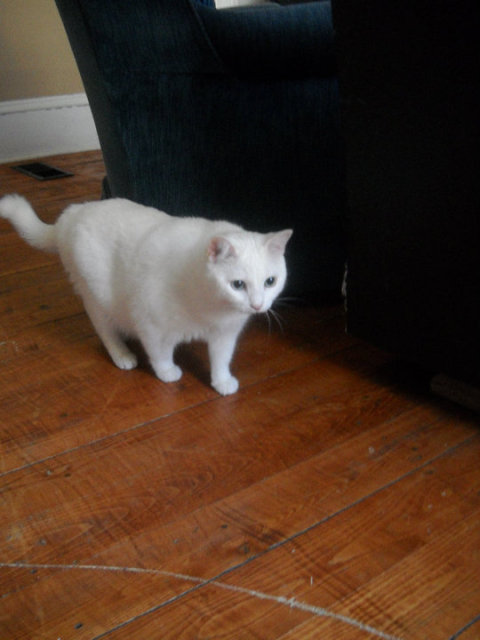Question
 3 weeks old with their
3 weeks old with their
4 weeks ago I was riding my horse down the road and ended up coming home with 3 baby kittens. It was a good thing because the next day we got 15 inches of snow! My guess is they are about 6 or more weeks now. I've been bottle feeding them and they seem to be doing fine. How long do I need to bottle feed? I've triied multiple times to get them to lap out of dish but they want nothing to do with it. With my busy work schedule it's hard to bottle feed them all the time. My 70 lb. dog has become the "mom" and does the "dirty work" for me. They are urinating on their own now but no bowel movement is that normal? I need all the suggestions and help I can get! Thank you!
AnswerAmy,
These babies are absolutely capable of lapping out of a bowl, weaning isn't fun or easy for anyone, but it must be done ASAP. Continuing to bottle feed as a main source of nutrition for these babies at this age just isn't sufficient - in order to grow properly and maintain good health these kids have to start eating solid food ASAP. I've found that the least stressful way to do this is to begin mixing meat/broth baby food (no onions, garlic or spices they're not good for cats) into their formula along with some plain, unsweetened yogurt (I prefer organic whenever possible) which will help to minimize the stess on the kittens' digestive tracts (hopefully avoiding serious diarrea). I generally would recommend that you begin introducing a kitten weaning formula (such as that made by KMR) and slowly reducing the amount of plain kitten formula over the course of a few days. As you start making the change to their formula you need to start adding the baby food and yogurt so that they start getting the nutrients they need. Over the course of the next week you'll want to add progressively more. If you want to continue offering any bottle feedings then I would also recommend against offering bottles anymore than once a day (purely for comfort), getting these babies eating out of a plate is a crucial skill that they need to master ASAP so that they can move on to solid foods that will provide them with the calories and nutrients that they need in order to meet the needs of their rapidly growing little bodies. If you wish you can make larger batches of formula, ready to serve or reconstituted KMR and/or KMR weaning formula can be frozen in small portion sized cubes by using an ice cube tray - it will keep for up to 6 months this way. Once the formula is frozen I'd suggest storing the cubes in a ziploc bag to keep them fresh. Even after weaning you can add formula to a properly balanced homemade raw diet or portions of high quality canned cat food (Wellness or Spot's Stew are my first choices) to add nutritional value to their meal (this allows you to use up any formula before it spoils and will add extra calories the kittens will need since bottle babies are often smaller for their age when compared to kittens raised by their mom).
The easiest way to get bottle babies lapping their food out of a plate is to place a couple of servings of formula mixed with a small amount of meat baby food and a couple of tablespoons of yogurt into a large plate (for 3 kittens a dinner plate will work since once they've figured out lapping they tend to end up in their plate, this way everyone's got room to eat whether they're in or out of the plate) and start off by gently dipping your finger into the food and touching it to a kitten's nose, s/he'll instinctively lick the food off, once the kitten starts licking the food from your finger (be patient, this may take several tries) then you'll need to gradually move the finger closer to the plate until the kitten is lapping from the plate, then you'll need to repeat the process with the other two kittens. You very well may have to repeat the process several times before it sticks. Be prepared, this is a messy process that will take some time, but I'm sure that your dog will have absolutely no problem with cleaning the babies up when they're finished eating. Once the kittens are lapping the formula, baby food and yogurt mix nicely then you'll want to add more meat and gradually reduce their formula, but do keep the yogurt in their food as you go along - you don't want these guys to get diarrea as this can be very serious, especially in orphaned kittens since they don't have the strength, weight and immunity that they would have if they'd been with mom all along. The nutritional needs of growing kittens are somewhat different than they are for other mammals, I would strongly encourage you to check out the following websites to learn more about feline nutrition:
1) http://www.halopets.com/pet-education/pet-articles/pet_food_what_you_need_to_kno...
This is a must read article for any pet parent whether you have feline or canine family members. It's educational to say the least, but I will forewarn you it will change the way that you think of pet food forever to the benefit of the health of each of your pets.
2) www.catinfo.org
This site was created by a veterinarian who wanted to help educate pet parents about the unique nutritional needs of their feline companions, debunk many of the myths set forth by the pet food industry and help pet parents understand why the majority of commercially produced pet foods simply aren't species appropriate. Many commercial foods fed over the long term will actually shorten the lives of cats and ultimately cause very serious problems since they just don't meet the needs of cats properly. Dr. Pierson also offers information on making a well balanced, healthy food at home for your cats as well as information about a few common behavioral issues.
3) www.catnutrition.org
This is a site that Dr. Pierson refers to on her site and it's geared specifically to educating pet parents about the nutritional needs of their feline companions. This site has a couple of recipes for homemade cat food that are similar to Dr. Piersons and I tend to use these recipes since they're meant to give larger quantities of food and I have a multiple cat household. Overall very interesting information and well worth the read.
4) http://www.felinespride.com
Feline's Pride is a company that makes a high quality raw cat food, they have several varieties and they will ship within the US and Canada via UPS guaranteeing that their food will arrive mostly frozen provided of course that you're home to receive the shipment. The information they provide is top notch and the testimonials are a must read. This company also has the endearing habit of including a kitty toy with their orders in addition to a reuseable cooler type container that you can wash, disinfect and reuse for your own needs.
The following websites offer important information about how often we should or shouldn't be vaccinating our animal companions as well as information about the health problems this can cause. There are also some sites with helpful tips for the first time kitty caregiver providing information about declawing, humane ways to help prevent or correct common feline behavioral issues with your new feline companions and information about spay/neuter surgery as well as facts to help you decide whether these babies should live as indoor only or indoor/outdoor cats. I compiled this list of websites for new kitty caregivers so that I could folks like you time by providing you with links to check out whenever it's convenient to get good answers to common questions and help you to make the right decisions for the long term health and well-being of your new baby companions. Hopefully you'll find the information provided on these sites useful.
1) http://www.cats.about.com/od/newtocats/tp/topmistakes.htm
2) http://www.declawing.com/htmls/declawing.htm
3) http://www.holisticat.com/vaccinations.html
4) http://www.shirleys-wellness-cafe.com/petvacc.htm
5) http://www.preciouspets.org/report.htm
6) http://www.premierepets.net/index_files/WhySpayNeuter.htm
7) http://www.fabcats.org/owners/safety/inorout/info.html
8) http://www.calgaryhumane.ca
This site has plenty of good information about developmental stages of kittens, dealing with common behavioral issues, etc. All you need to do to access this info is to go to services, animal behavior is located under services, then mouse over animal behavior to click on animal behavior resources - the cat topics are located on the right side of your screen.
9) http://www.professorshouse.com/pets/cats/weaning-kittens.aspx
I don't agree with this site's opinion on feeding kibble as a primary source of nutrition or the information provided about life stage formulations of cat food (see catinfo.org to have a clearer understanding of the information I'm basing my opinions on), but they do offer clear information on weaning kittens and finger feeding to help introduce solids.
10) http://www.ora-animalrescue.org/catcare2.html
Clear information on vaccines and the health risks involved with over administering these potentially life saving preventative medicines.
11) http://www.pet-informed-veterinary-advice-online.com/sexing-kittens.html
This site has very clear photos to help you determine the genders of your bottle babies accurately just in case you haven't sexed kittens before.
If you have any further issues that you'd like help with when it comes to weaning these babies I'd certainly be happy to help with them or any other questions or concerns you might have over the coming years. I hope that the sites I've referred you to will help to answer some of your questions as well as provide you with the facts about important feline care issues. Please feel free to contact me again if you have any further questions, concerns or you'd like to have me clarify anything in this answer, I'd be happy to help you out to the best of my ability.


 Breed
Question
Sammy Sammy
We found this cat out
Breed
Question
Sammy Sammy
We found this cat out
 Breed Identification
Question
Zoey
I was curious if you could identify the b
Breed Identification
Question
Zoey
I was curious if you could identify the b
 Please help
Questionmy cat
QUESTION: Hi,
I have a Ragdoll ca
Please help
Questionmy cat
QUESTION: Hi,
I have a Ragdoll ca
 how long do I need to bottle feed?
Question
3 weeks old with their
4 weeks ago I was ridin
how long do I need to bottle feed?
Question
3 weeks old with their
4 weeks ago I was ridin
 cat identification
Question
pic was from my phone,
i am currently f
cat identification
Question
pic was from my phone,
i am currently f